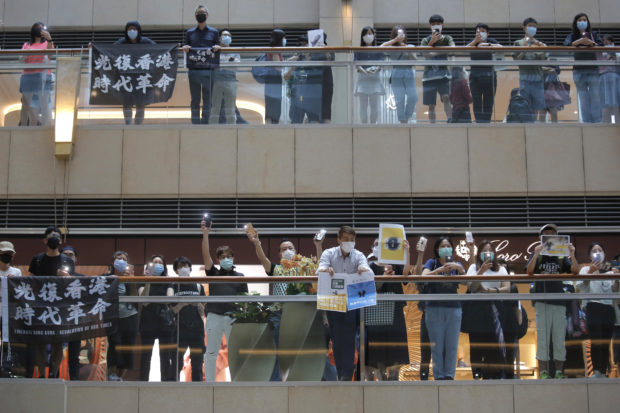China passes draft of controversial Hong Kong security law

Pro-Hong Kong demonstrators shout slogans during a protest at a shopping mall in Hong Kong, Tuesday, June 16, 2020. Hong Kong leader Carrie Lam on Tuesday said she hoped that the opposition would not “demonize and stigmatize” the new national security law as doing do would mean pitting themselves against the people of Hong Kong. (AP Photo/Kin Cheung)
HONG KONG — China’s ceremonial legislature on Thursday passed a draft of a national security bill for Hong Kong that has been strongly criticized as undermining faith in the semi-autonomous Chinese region’s legal and political institutions.
The National People’s Congress’ Standing Committee reviewed the bill that covers four categories of crimes: succession; the subversion of state power; local terrorist activities; and collaborating with foreign or external foreign forces to endanger national security.
Congress moved to enact the legislation at the national level after Hong Kong’s own Legislative Council was unable to do so because of strong local opposition. Critics say it could severely limit free speech and opposition political activity and legal experts say Beijing’s legal justifications for acting are highly debatable.
China acted after the widespread and sometimes violent anti-government protests in the territory last year that Beijing saw as a dangerous campaign to split Hong Kong from the rest of China.
The United States has said that if the law is passed it will revoke some of the special privileges granted to Hong Kong after the former British colony was handed over to Chinese rule in 1997, while Britain has said it will offer passports and a path to citizenship to as many as 3 million Hong Kong residents. Beijing has denounced the moves as interference in its sovereign affairs.
Article continues after this advertisementOn Wednesday, the Group of Seven leading economies called on China to reconsider its plans in a joint statement voicing “grave concern regarding China’s decision to impose a national security law on Hong Kong,” adding that it would breach Beijing’s international commitments as well as the territory’s constitution.
Article continues after this advertisement“It would jeopardize the system which has allowed Hong Kong to flourish and made it a success over many years,” they said. “Open debate, consultation with stakeholders, and respect for protected rights and freedoms in Hong Kong are essential.”
The Asian financial hub’s highly respected legal system already covers security issues from money laundering to terrorism and cybercrime. That leaves the proposed legislation to deal with vaguely defined crimes of a highly political nature along the lines found in mainland China’s Communist Party-dominated system.
Earlier this month, Hong Kong’s legislature approved a contentious bill making it illegal to insult the Chinese national anthem after pro-democracy lawmakers boycotted the vote out of protest. Senior opposition figures have also been arrested for taking part in demonstrations and questions have arisen over whether the national security legislation will be used to disqualify pro-democracy candidates in September’s elections for the Beijing-controlled Legislative Council.
RELATED STORY
Hong Kong’s controversial security law: What is it and why does China want it?